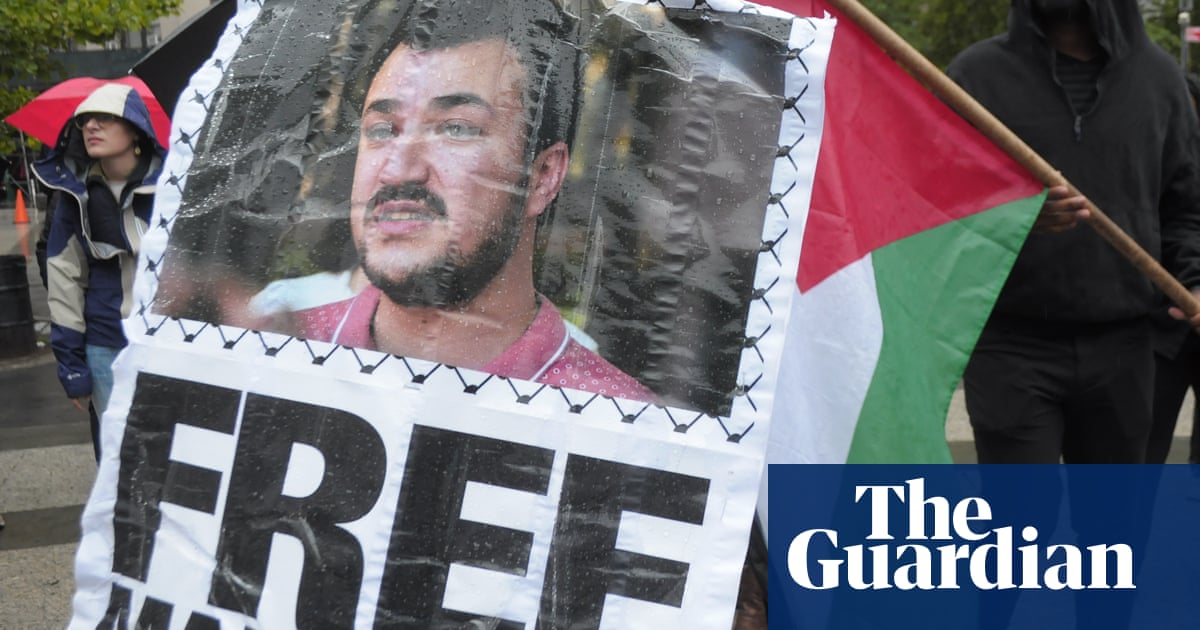The Trump administration’s bid to deportMahmoud Khalil, the Columbia University student and pro-Palestinian activist, is likely unconstitutional, a US judge has said.
In a lengthy order issued Wednesday, Judge Michael Farbiarz wrote that the government’s primary justification for removing Khalil – that his beliefs may pose a threat to US foreign policy – could open the door to vague and arbitrary enforcement.
Still, Farbiarz stopped short of ordering Khalil released from a Louisiana jail, finding his attorneys had not sufficiently responded to another charge brought by the government: that Khalil did not properly disclose certain personal details in his permanent residency application.
The judge said he planned to issue an order shortly outlining next steps in the case.
Khalil, a legal US resident, was detained by federal immigration agents on 8 March in the lobby of his university-owned apartment, the first arrest under Donald Trump’s widening crackdown on students who joined campus protests against Israel’s war in Gaza.
He has been held for nearly 12 weeks at an immigration detention center in Jena, Louisiana, missing the birth of his first child and his recent graduation fromColumbia University.
Attorneys for Khalil argue his detention is part of a broader attempt by theTrump administrationto suppress constitutionally protected free speech.
In letters sent from the jail, Khalil has maintained that his arrest was “a direct consequence of exercising my right to free speech as I advocated for a free Palestine and an end to the genocide in Gaza”.
The federal government has not accused Khalil of breaking any laws. Instead, they have submitted a memo signed by the secretary of state, Marco Rubio, arguing that Khalil’s presence in the US may pose a threat to US foreign policy interests.
The government has offered the same justification to detain other pro-Palestinian activists, including another student at Columbia, Mohsen Mahdawi; a Tufts University student, Rümeysa Öztürk; and a Georgetown University scholar, Badar Khan Suri. All three have won their custody in recent weeks as they continue to fight their cases.
In Khalil’s case, the government also said he withheld information from his residency application about his involvement in some organizations, including a United Nations agency that resettles Palestinian refugees and a Columbia protest group.
The judge on Wednesday said attorneys for Khalil had not properly responded to those allegations, but would be permitted to address the issue in the future.
Nico Perrino of the Foundation for Individual Rights and Expressioncalled ita “mixed ruling” on Khalil’s motion for a preliminary injunction, because the judge wrote that he “is likely to succeed on his First Amendment claim, but likely to lose on a residency application issue. For that reason, the judge denied the request for a preliminary injunction, pending further briefing on the First Amendment issue.”
Farbiarz’s ruling marked the first time a federal judge had weighed in on the constitutionality of Trump’s use of a law granting the US secretary of state the power to seek the deportation of any non-citizen whose presence in the country is deemed adverse to US foreign policy interests.
The Newark, New Jersey-based judge said the law, known as section 1227, was vague because people would have no way of knowing what might get them deported.
“An ordinary person would have had no real inkling that a Section 1227 removal could go forward in this way – without the Secretary first determining that there has been an impact on American relations with another country,” Farbiarz said in a 101-page ruling.
Khalil and his supporters say his arrest and attempted deportation are violations of his right to freedom of speech under the US constitution’s first amendment. Farbiarz has blocked officials from deporting Khalil while his challenge to the constitutionality of his arrest plays out.
He wrote that he would not rule for now on whether Khalil’s first amendment rights had been violated.
In a statement, Khalil’s legal team said it would give Farbiarz the additional argument he sought as quickly as possible.
“Every day Mahmoud spends languishing in an Ice detention facility in Jena, Louisiana, is an affront to justice, and we won’t stop working until he is free,” his lawyers said.
